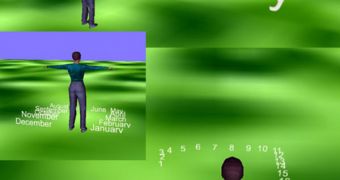Spatial-sequence synesthesia is a special form of the condition, in which people tend to see all numerical sequences they come across as visual patterns. Synesthesia is a very hot and debated topic, since some of the people who have it say that they wouldn't get rid of it even if they could, while others would gladly do so if given the chance, for whatever reason. Those suffering from spatial-sequence synesthesia (SSS) have one more reason to appreciate their condition – a new study has revealed that SSS allows for superior memory formation and storage inside the brains of people who have it.
For example, the days in a calendar may appear in the eyes of SSS patients as a spiral staircase, so real that they could almost reach and touch it, they say. Synesthets, in general, tend to perceive the stimuli they see with more senses at once. They, for instance, associate smells with colors, tastes with sounds, and any combination of the five senses you could think of. Their mental representations of classic objects and notions may differ considerably from the ones people without synesthesia have, ScienceNow reports.
The new investigation was able to determine that those with SSS tended to recall past events and memories far better, and in far greater detail than peers without the condition. They can essentially act as gateways into the past, recalling events that other people have forgotten. The new work was conducted by experts at the University of Edinburgh in the United Kingdom, led by psychologist Julia Simner. Ten spatial-sequence synesthetes were analyzed in the research, as the team asked them to recall events from far back in their pasts, without any prior training.
Each of the test participants were asked to recall the dates of some 120 public events that occurred between 1950 and 2008. On average, when it came to giving the correct date, they tended to be off by about four years, on average. In the case of people in a control group, who did not have SSS, the margin for error was of eight years, two times greater. When it came to recalling events in their own lives, the synesthetes were able to give data on two times more occurrences than those in a control group. Details of the study appear in the November-December issue of the journal Cortex.

 14 DAY TRIAL //
14 DAY TRIAL //